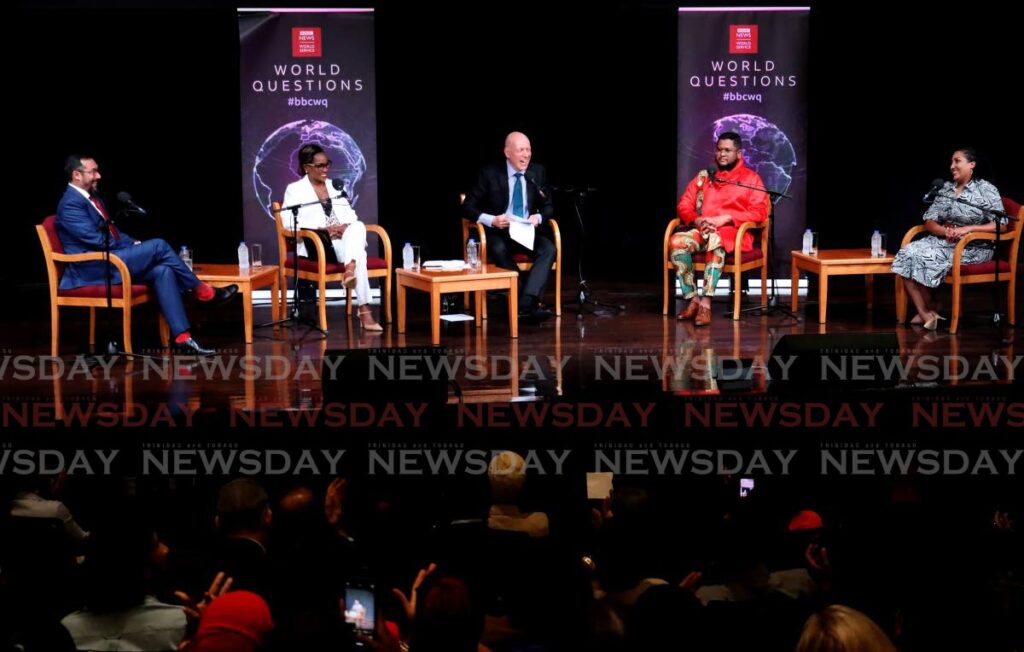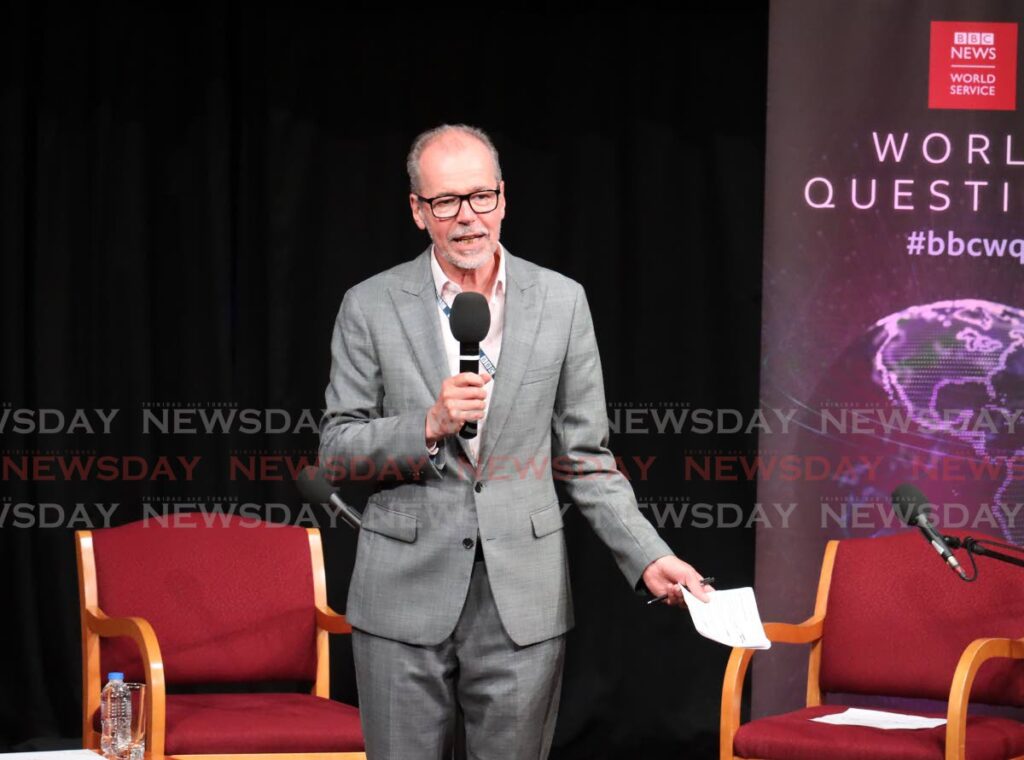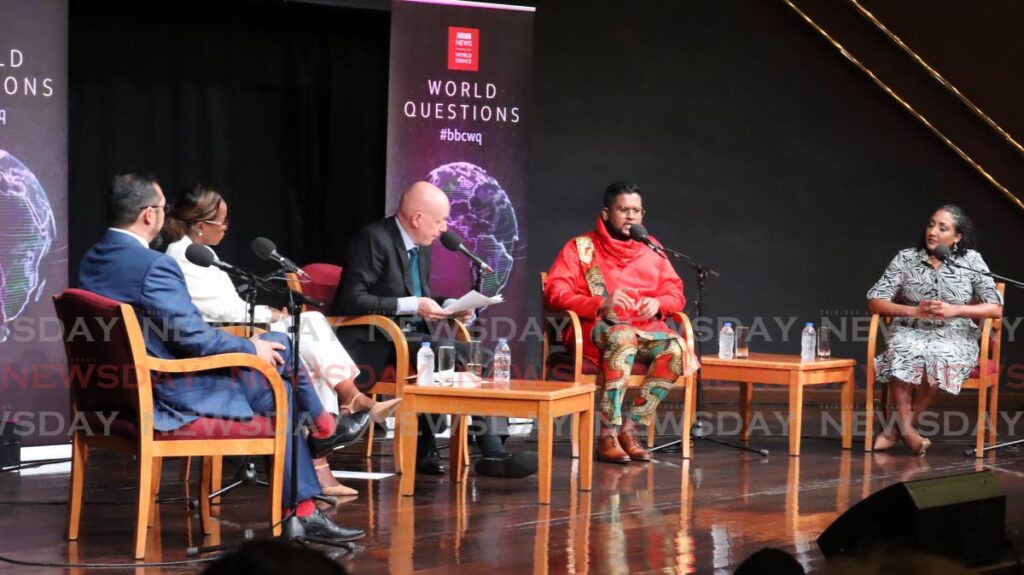BBC World Questions visits Trinidad and Tobago

Carnival draws many people to this country, but it's rare for international media coming to discuss those disputed issues that are often ventilated through Trinidad and Tobago’s own media outlets.
That was one reason why the British Broadcasting Corporation's (BBC) World Questions’ visit to the country on June 7 and aired on June 10 drew a crowd curious to see what the collective response would be.
BBC World Questions is a series of monthly international debate programmes recorded on location by the world-famous media corporation.
“Each edition is led entirely by the audience who can make comments and put questions to a panel of leading thinkers and politicians,” a statement on the show explains.
The recording of the popular radio programme took place at Central Bank Auditorium, Port of Spain on that day.
The result was a 52-minute-59-second programme featuring MP for Port of North/St Ann’s West and Minister of Energy and Energy Industries Stuart Young, Opposition MP for Tabaquite Anita Haynes, UWI economist Dr Marlene Attzs and Heroes Foundation CEO Lawrence Arjoon discussing LGBTQIA rights, energy, crime, race relations, climate change –and whether the panellists were ever wrong.
From 6 pm, there was a line outside the Central Bank on Lower St Vincent Street, Port of Spain, as people waited to enter the auditorium for the 7 pm start.
At a reception inside, a woman who wished to be identified as "Rampersad" said she had come from Couva to attend because, “When I saw it advertised, I thought it was an excellent opportunity to see, firsthand, how (the) BBC operates, how they bring different perspectives to life. I think it is a very vibrant media organisation, vibrant media house.

"And it is also an opportunity to meet my fellow Trinidadians and get their perspectives on things. I particularly like the question part of it, where it is open and you can ask anything you want.”
Rampersad was among many people who wrote their questions on cards before the programme started. Eight were chosen from the many that were submitted.
Rampersad said she was particularly interested in hearing from Arjoon, as there was so much going on with TT’s economy and politics, and wanted to know its impact on youth.
She also wanted to hear Arjoon’s response on how to get youths politically involved.
Before the debate began, one of the show’s team members described the terms of engagement, telling the audience there would be parts that would make them laugh, shake their heads and, if they enjoyed a comment, applaud.
He said they wanted an open, polite and respectful debate, though if they disagreed, they were free to do so, and silence was a powerful tool in that case.
The show’s team went to audience members with a mic for comment on some questions.
Producer Charlie Taylor said he felt TT had the “largest queue he had ever seen.”
“We want to hear all points of view,” Taylor told the audience.
BBC News royal correspondent Jonathan "Jonny" Dymond hosted the event.
His brief scripted introduction said TT was the most prosperous country in the Caribbean, with a rich culture and a stable democracy, which sits on a lake of oil and gas, but faces challenges such as the trade in drugs and humans, as well as a growing gang culture which brought TT the highest murder total on record last year.
The first question posed to the panel was from Rishi Mahadeo, who said, “My father was a farmer plagued by crime until he was murdered on his farm two months ago. To date, no homicide detective has been assigned to us. Why have the past and present governments and the police service failed us on crime?”

Dymond said the team had received many questions on crime.
Young began his response by saying that crime affects everyone and the Government was very conscious of it and disturbed. He said the Government was working with the police and other arms of national security on it.
He said crime affected everywhere in the world, TT was trying to use as much technology as possible to boost the morale of the police, and this was a top priority.
Young promised Mahadeo to inquire into the matter.
Haynes said it had been a difficult few years looking on at the crime situation. TT had been putting resources into a problem without measuring the efficiency with which those resources are being mobilised in the best interest of the country.
She said every year there was a reactionary approach and at the end there was no acknowledgement of the crime prevention and suppression methods that worked, did not work or could work better if improvements were made.
“We aren’t thinking clearly and critically about decades of billions of dollars being spent behind the crime situation,” she said.
Attzs said both Young and Haynes made valid points, but her contribution focused on institutional frameworks.
She said the police were seen as a panacea, and when something happens they are meant to solve it.
This was not a helpful approach, she said, as the police were an institution which, if not properly resourced, financially and otherwise, would not be equipped to address the kinds of challenges seen in TT.
Attzs said while she was not a criminologist, it was apparent that the nature of crime had changed and the institutional framework had to adapt; it was not simply a question of budgetary allocation. She said the country needed to demand more of its politicians going forward on this issue.
Arjoon said trust and meaningful collaboration were critical to building a safe and sustainable TT. He said this was not a society that trusts, and that started from its leaders and filtered through the societal layers.
“It is clear that we in TT have the insight, expertise and knowledge to fix all of the problems we are being faced with. We heard it from the three speakers that went before me: we know what to do, but it is going to take all of us to do it.
“So starting with the politicians, the examples you set in the Parliament and on the political platform: you cannot be attacking our own people and dragging every good thing that is done in this country through the mud because it does not align with 'our' political party.”
Arjoon’s comment drew immediate applause from the audience.
He said TT had made strides but there was still work to do. Using the Children’s Authority as an example, he said 20 years ago TT did not have one but it exists now.
The audience weighed in on crime, some saying the issue had to deal with corruption in the police.
Political leader of the New National Vision party Fuad Abu Bakr, who was in the audience, said the issue with crime was that there was no reform, and many of TT’s leaders were afraid of it.
Throughout the evening both Arjoon and Attzs won applause on various topics, Attzs was especially open when she addressed race, saying it only became an issue on the political level. A Jamaican in the audience agreed, saying she often saw people of all different races living and working seamlessly together.
Other audience members commented, with some asking for open debate on this and other topics among the country’s politicians outside Parliament.
On LGBTQIA rights, it was asked when people would be protected by law from discrimination and violence based on sexual orientation and gender identity. Dymond said the legal ban on homosexual sex was overturned in 2018 but remained on the statue books and was working its way to the Privy Council.
Young said he wanted to know in what area was there not protection for everyone. He said if the current law was applied it was a crime for anyone to exact physical violence on anyone.
He said everyone is allowed to express their views and “practices” and that was constitutionally protected. He said there were some archaic laws but there was an Equal Opportunity Commission and legislation.
The recorded show is available at https://www.bbc.co.uk/programmes/w3ct59t3

Comments
"BBC World Questions visits Trinidad and Tobago"